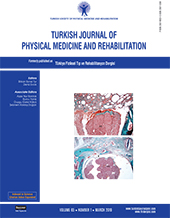Impulsivity and ankylosing spondylitis: Is there a relationship?
Patients and methods: Between May 2016 and January 2017, a total of 70 AS patients (30 females, 40 males; mean age 42.9±10.5 years; range, 22 to 70 years) and 56 healthy controls (27 females; 29 males; mean age 44.8±13.0 years; range, 21 to 70 years) were included. Demographic characteristic, laboratory analyses, disease activity, quality of life, functionality, fatigue, and psychological disorders were assessed. The Ankylosing Spondylitis Disease Activity Score (ASDAS), Bath Ankylosing Spondylitis Functional Index (BASFI), Bath Ankylosing Spondylitis Metrology Index (BASMI), Nottingham Health Profile (NHP) and Ankylosing Spondylitis Quality of Life (ASQOL), Fatigue Severity Scale (FSS), Beck Depression Inventory (BDI), Beck Anxiety Inventory (BAI), Toronto Alexithymia Scale (TAS-20), Eating Attitude Test (EAT), and Barratt Impulsiveness Scale-11 (BIS-11) were used. Significant predictors for anxiety, depression and impulsiveness were evaluated using multivariate analyses.
Results: The BDI (13.88±8.99; 9.78±8.34), BAI (14.58±10.02; 10.53±8.99), and non-planning impulsivity (26.00±4.57; 24.28±3.77) scores were higher in the AS group than controls (p=0.01; p=0.01; p=0.02 respectively). Non-planning impulsivity was correlated with fatigue, social isolation, and depression (p=0.03; p=0.01; p=0.01 respectively). Multivariate analyses showed that fatigue scores were positively associated with nonplanning impulsiveness.
Conclusion: Impulsivity may be one of the psychiatric disorders associated with AS, such as the more commonly known anxiety and depression. Fatigue is considered as a critical target for increased impulsivity.
Keywords : Ankylosing spondylitis, fatigue, impulsiveness, psychiatric disorders

















